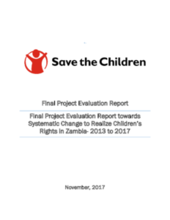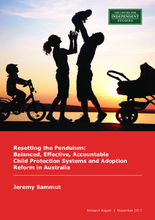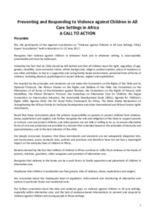Displaying 471 - 480 of 1028
This report from Community Living for Europe: Structural Funds Watch reviews findings of an examination of the EU financial framework as it relates to the promotion of community-based care of children and adults and offers key recommendations for the EU and Member States to facilitate the transition from institutional to community-based care.
This report outlines the MEASURE Evaluation workshop sessions and provides highlights, key discussion points, and action items.
The purpose of this endline evaluation is to assess the CRG, CP and HIV&AIDS achievements against the project goal and outputs.
This research report reviews the child protection and adoption policies in Australia and the long-term plan of the New South Wales (NSW) government "to restructure the operation of the child protection system to increase sustainability and improve performance by achieving permanency for more children."
This report outlines the sessions of a workshop help in London with representatives from four countries participating in a USAID/DCOF-funded activity aimed at intensifying country leadership in advancing national efforts on behalf of children who lack adequate family care, and provides highlights, key discussion points, and action items.
This discussion paper explores the interlinkages between violence against children and children's care in the African context, including in legal and policy frameworks, data collection and use for decision making, service delivery, and public awareness to ensure families can be supported and empowered to provide protective, stable, and appropriate care for children.
This video from UNICEF Rwanda shows some of the moving stories of children and their new families who have been brought together through the TMM initiative, which reintegrates children who have been living in institutions into families and the community.
This position paper from Opening Doors for Europe's Children explains the position of the organization in regards to the EU's Multiannual Financial Framework and the measures within it to support or inhibit the transition from institutional care to family-based care of children.
This Annex compiles the presentations delivered at the 21-22 June 2017 Africa Expert Consultation on Violence Against Children in All Care Settings and is intended to accompany the Final Report of the meeting.
Resulting from the June 2017 Africa Expert Consultation on Violence against Children in All Care Settings and adopted by all participants, this Declaration calls upon leaders at national, sub-regional, pan-African and global levels for further action to fulfill their obligation to protect children against violence in all care settings, with emphasis on alternative care.









